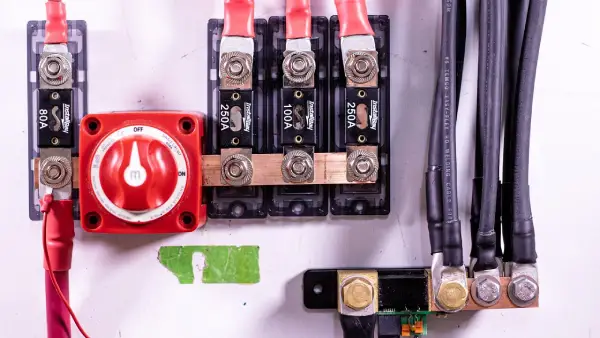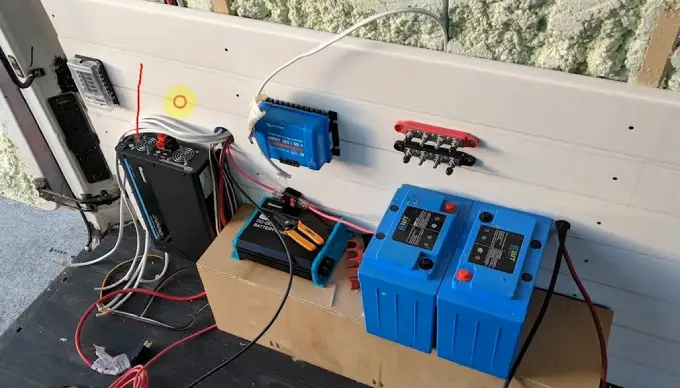Last Updated on May 1, 2023
As an RV enthusiast, you know that smooth journeys are the outcome of preparedness. Knowing the fuse size that should protect your battery can be critical to your preparation. It is essential to understand that the wrong fuse size can cause electrical problems that could ruin your trip.
Avoid becoming stranded with a boiled wiring system; investing in the right fuse is key. While 30 Amps may provide enough protection for your battery from overloading, if you plan to add an inverter to your RV, it’s best to upgrade the fuse’s size and wire gauge level accordingly.
Learn how you can ensure your RV battery is correctly outfitted for a safe and secure trip. We’ve got all the info on choosing just the right size fuse.
What Size Fuse For RV Battery: How to Determine?
To determine the correct size fuse for your RV battery, you need to consider the amperage draw of your RV’s electrical components and the wiring and circuit protection in place. The right size fuse will protect your battery and electrical system from damage due to overloading or short circuits.
Calculating the amperage draw is the first step in determining the correct fuse size for your RV battery. This can be done by adding up the amperage ratings of all your RV’s electrical components that are connected to the battery.
Suppose you have a refrigerator that draws 5 amps and a water pump that draws 3 amps, so your total draw would be 8 amps.
Once you have calculated the total amperage draw, you can select a fuse with a rating slightly higher than this number. It’s important not to choose a fuse with too high of a rating, as this could cause damage to your battery or electrical system in case of a short circuit.
The type of fuse used in an RV battery also plays a role in determining the correct size. There are two main types: blade fuses and glass tube fuses. Blade fuses are more common and come in sizes ranging from 5 amps to 30 amps. Glass tube fuses are less common but offer higher amp ratings up to 60 amps.
What Do You Need to Know About RV Battery Fuse Sizes?

Fuse plays an essential role in the safety of your RV’s electrical system. Making sure you get the correct size for your battery is key, but figuring out which one? That can be a bit of a puzzle.
Many factors come into play when choosing the right fuse.
#1: Amp Rating of the RV Battery
The amp rating of your RV battery is essential when selecting the right size fuse. The amp rating indicates the amount of electrical current your battery can continuously provide without overheating or sustaining damage.
It’s important to note that RV battery amps may vary depending on its type and size. For instance, a deep-cycle battery typically has a higher amp rating than a starting battery due to its ability to provide sustained power over an extended period.
Choosing a fuse that matches or exceeds your RV battery’s amp rating is crucial. Using a fuse with a lower amp rating than your battery could result in the fuse frequently blowing due to overload.
Using one with a higher rating could lead to catastrophic damage to your RV’s electrical system.
To determine the correct amp rating for your RV battery, you can check its label or consult its manufacturer’s specifications. It’s also essential to ensure that all wiring and circuit protection components in your RV are rated appropriately for the amperage draw of your battery.
#2: Wiring and Circuit Protection
Wiring and circuit protection are crucial when choosing the right fuse for your RV battery. The wiring in your RV must handle the amperage draw of your battery, and the fuse protects both the wiring and your RV’s electrical system from damage caused by a short circuit or overload.
In terms of RV wiring, you want to ensure it is appropriately sized for your battery’s amp draw. If the wiring is too small, it can overheat and cause a fire.
Conversely, if the wiring is too large, it can be difficult to work with and may not fit properly in tight spaces.
Along with proper wiring, you also need to consider circuit protection. This involves using fuses or circuit breakers to protect against short circuits and overloads. A short circuit occurs when two wires touch each other or when a wire touches the metal on your RV’s frame.
An overload occurs when too much current flows through a wire, which can cause it to overheat and potentially start a fire.
#3: Environmental Conditions
Environmental conditions can significantly impact the performance and lifespan of your RV battery fuse. Extreme temperatures, humidity levels, and exposure to sunlight can all affect the fuse’s ability to function properly.
High temperatures can cause the fuse to blow prematurely, while low temperatures can reduce its conductivity. Humidity levels above 80% can also lead to corrosion and damage to the fuse. Therefore, storing your RV in a cool, dry place protected from direct sunlight and moisture is essential.
Suppose you plan to use your RV in extreme weather conditions like winter or summer. In that case, it is recommended that you choose a weather-resistant fuse that can withstand these environmental factors.
These fuses are designed with special coatings or materials that protect them from damage caused by temperature changes and moisture.
It is also essential to regularly inspect your RV battery fuse for any signs of wear or damage caused by environmental factors. Look for cracks, discoloration or any other physical abnormalities that may indicate a problem with the fuse.
If you notice any issues, it is best to replace the fuse immediately to avoid potential risks or malfunctions.
#4: Calculating Amperage Draw
Calculating the amperage draw of your RV battery is essential in determining the correct size fuse to use. The amperage draw is how much power your RV battery uses while running. Understanding this information will help you select a fuse that can handle the electrical load of your RV.
To calculate the amperage draw, you need to know the total wattage of all the appliances and devices in your RV that are powered by the battery. You can find this information on each device or appliance by looking at its label or manual.
Once you’ve got all this info, you can use a simple formula to calculate the amperage draw:
Amperage Draw = Total Wattage / Battery Voltage
For example, if you have a 12-volt battery and your total wattage is 1200 watts, then your amperage would be:
Amperage Draw = 1200 / 12 Amperage Draw = 100 Amps
This means that your RV battery is drawing 100 amps of electrical current while it’s running.
It’s important to note that different appliances and devices may have different amperage draws. For example, a small LED light may only draw a few milliamps, while an air conditioner could draw over 10 amps.
Make sure to add up all the individual amperages to calculate your total amperage draw accurately.
#5: Selecting the Correct Fuse Rating Based on Amperage Draw
When selecting the correct fuse rating for your RV battery, the amperage draw is the most crucial factor to consider. The amperage draw is the amount of electrical current that flows through a circuit, and it can vary depending on the devices and appliances connected to your RV.
To determine RV battery amperage, you can use a multimeter or an amp clamp meter. Simply connect the meter in series with the circuit and measure the current flow. You can also check the manufacturer’s RV device and appliance specs.
After determining the amperage draw, choose a fuse slightly higher rating than the maximum expected current flow. This will ensure the fuse does not blow unnecessarily while providing adequate protection for your RV battery.
For example, if your RV has an amperage draw of 20 amps, you should select a fuse with a rating of at least 25 amps. It is important not to exceed this rating, as using a higher-rated fuse may damage your RV’s wiring or electrical components.
Does the Type of RV Battery Affect the Fuse Size?

Your RV battery may seem like it’s just one part of a complex system, but the type you choose makes all the difference. Whether purchasing a large-capacity deep cycle or something smaller, know that your fuse requirements will also be affected.
There are several types of RV battery fuses available in the market. Each type has its own unique features and characteristics, which make them suitable for different applications.
One common type of RV battery fuse is the blade fuse. This fuse has a plastic body with two metal prongs that fit into a fuse holder. Blade fuses come in different amperage ratings and are commonly used to protect electrical circuits in RVs.
Glass tube fuses are another RV battery fuse type. These fuses have a glass body with metal caps on each end. The metal caps can be either threaded or soldered onto the ends of the fuse element. They’re commonly used to protect sensitive electronics and come in different amperage ratings.
Ceramic fuses are another type of RV battery fuse that is commonly used in high-temperature applications. These fuses have a ceramic body with metal end caps that are either soldered or crimped to the ends.
Resettable circuit breakers are another type of RV battery protection device that can be used instead of traditional fuses. These devices automatically reset themselves after tripping, eliminating the need for replacement.
How Do You Install a Right-Sized RV Battery Fuse?
Installing an RV battery fuse isn’t a task to be taken lightly. Always follow manufacturer instructions to ensure the job is done right since that’s your best guarantee of proper function. Do it any other way, and you may risk damage or worse.
A key aspect of proper installation is ensuring the fuse is securely fastened. Loose fuses can cause electrical arcing and potentially lead to a fire or other safety hazard. To prevent this, use a fuse holder or panel that is designed to securely hold the fuse in place.
Another important consideration when installing RV battery fuses is ensuring the wiring connections are tight and secure. Loose connections can cause voltage drops and damage your RV’s electrical system. Use wire connectors or crimping tools to ensure a tight connection between the wiring and the fuse.
As discussed in previous sections, choosing the right fuse is also essential. Installing a fuse with too high of an amp rating can lead to electrical overload and potential damage to your RV’s electrical system.
However, using a fuse with a low amp rating can cause it to blow prematurely, requiring frequent replacement.
Also, always make sure to label your fuses clearly so you can easily identify them later. This will save you time and hassle if you need to replace a faulty fuse.
How to Identifying Faulty Fuses and Replacement Procedures
Identifying faulty fuses in your RV battery is crucial to ensure its proper function and avoid potential electrical hazards. A fuse is designed to protect the electrical system of your RV from overloading, short circuits, or other electrical faults.
When a fault occurs, the fuse blows and prevents excessive current flow that can damage the battery or other components.
To identify a faulty fuse in an RV battery, you need to visually inspect each fuse for any signs of damage or wear. Check if the fuse element is broken, melted, or discolored. If you notice any of these signs, the fuse has blown and needs to be replaced.
Another way to identify a faulty fuse is by using a multimeter. Set the multimeter to continuity mode and touch both ends of the fuse with its probes. If there’s no continuity (i.e., an open circuit), it means that the fuse has blown and needs replacement.
When replacing a faulty fuse, use a new one with the same amp rating as the original one. Using a higher or lower amp rating can cause electrical problems, including overheating or failure of other components.
To replace a blown fuse, follow these steps:
- Turn off all power sources connected to the battery.
- Locate the faulty fuse and remove it from its holder.
- Insert a new fuse with the same amp rating into the holder.
- Turn on power sources and check if everything is working correctly.
What Is the Recommended Fuse Size For a 12v RV Battery?

Protection is paramount in keeping your electronic devices safe and powered to their maximum potential. To ensure the best defense against fires or other hazards resulting from electrical surges, a 12v RV battery must be fused at an appropriate size.
To determine the right fuse size for your 12v RV battery, you need to know the device’s load expressed in watts or amps. If the device’s load is given in watts, you can calculate the required amperage by dividing the wattage by the battery voltage.
For example, a 100-watt device connected to a 12v battery would require an 8.3-amp fuse (100W/12V = 8.3A). It is recommended to use a 10-amp fuse to give a safe margin.
If you’re unsure what fuse size to use, consult the manufacturer’s instructions or get professional advice.
Is It Okay to Replace A 15 amp Fuse With A 20 amp Fuse?
Replacing a 15-amp circuit breaker with a 20-amp one is unsafe without proper evaluation and consideration. The circuit breaker is critical to protecting your home from electrical fires. It does so by interrupting the circuit’s flow of electricity when it detects an excessive amount of current.
The amount of current that a circuit breaker can handle is determined by its amperage rating. A 15-amp circuit breaker can handle up to 15 amps of current, while a 20-amp circuit breaker handles 20 amps.
It could be a disaster if you upgrade your current breaker to a 20-amp one without figuring out why it tripped.
A 15-amp circuit breaker is designed to protect the wiring in your home and the attached electrical devices from overheating or overloading. If there is a fault or a short circuit, the breaker will trip and break the circuit, preventing electrical fires.
A 20-amp breaker can allow more current to flow than the wiring can handle, causing it to overheat or become overloaded, resulting in an electrical fire.
In most cases, simply upgrading the circuit breaker to allow more current flow is a Band-Aid fix for a more significant electrical issue that needs addressing. Before making any changes, you need an electrician to evaluate your wiring to determine what’s tripping.
Are 48v Fuses Compatible With 12v RV Batteries?
RV owners need to ensure their power system is correctly set up, and one common concern relates to 48V fuses. Fortunately, the answer is a simple yes, as long as they meet or exceed your battery’s maximum capacity rating, you can rest easy knowing that these two components will play nicely together.
It’s worth noting that a fuse’s voltage rating refers to the point at which it will break down and interrupt the circuit.
Because of this, using a fuse with a higher voltage rating than the system it’s protecting won’t cause any harm or damage.
As a result, you can use a 48V fuse with a 12V RV battery system without any issues, provided the voltage is within the fuse’s capacity. Fuse voltage ratings should always be higher than the circuit’s operating voltage to avoid voltage spikes or fluctuations.
Protect Your Circuit: Get the Right Fuse Size
A thorough understanding of fuses’ role in RV battery systems is critical for ensuring the safety and longevity of your equipment. It is important to consider factors such as amp rating and circuit protection carefully when selecting the appropriate fuse size.
By accurately calculating the amperage draw and choosing the correct fuse rating, you can prevent electrical overload and avoid potential equipment damage. Alongside proper installation techniques, identifying and replacing faulty fuses is essential for optimal RV battery system operation.
Following these best practices allows you to enjoy a safe and reliable RV experience for years. Remember, always prioritize safety by using the correct size fuse for your system.



